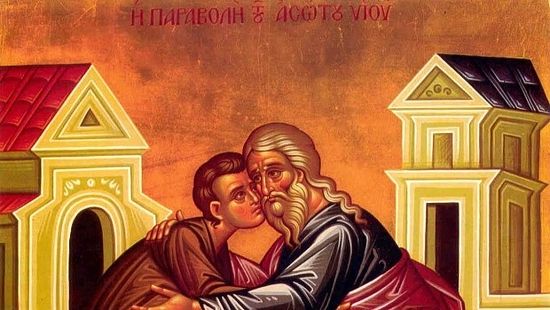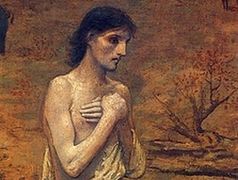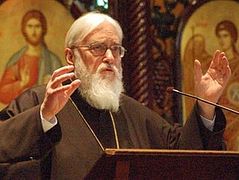Source: Orthodox Christian Network
February 24, 2016
One of the most important stories in the New Testament is the Parable of the Prodigal Son. A man had two sons and the younger of the two sons went to his father and asked him for his share of his inheritance. An inheritance is something you only get when your father dies, so in asking for the inheritance, it was as if he was wishing his father was dead. An inheritance is also a gift. It is not purchased but given from parent to child, in this case from father to son. The father gave the inheritance freely, even though the son had treated the father shamefully.
The son took the inheritance, went to a far country, and in short order, he wasted the inheritance on loose living. When someone has a lot of money, generally they have a lot of “friends.” And when someone has no money, there are no “friends,” because there is no money to have a good time. So, all of his new-found “friends” abandoned the son, who found himself hungry and alone. In order to not die, he got a job tending swine and he ate the food of the swine, because it was either that, or perish from starvation.
There was another option, however. And one day, the son “came to himself” and realized that his father’s servants lived better than he was living. And he made the decision to go back to his father and not only ask forgiveness but ask to be a servant, rather than a son.
What is the difference between a son and a servant? A son is entitled to not only inheritance, but to his father’s love. The son, in coming to himself, wanted to ask his father for neither inheritance nor love. He knew he was not deserving of either.
The meaning of this parable is this—the inheritance is our faith, the gift of salvation purchased through the Cross and Resurrection of Christ. It is a gift bestowed to all those who believe. When we sin, we are the Prodigal Son, for in the moment we sin, we are wasting our inheritance, we are squandering our faith. When we sin, we separate ourselves from God. He doesn’t separate from us. WE are the ones who leave and go to the “faraway land.”
If you know this story well, you know that the father quickly forgave the son. We’ll be talking about that in the next reflection. However, that was not the key moment in the story. The key moment was when the son “came to himself” and realized that he needed to go back to his father, to ask his forgiveness and to offer to be his servant. This “coming to” moment is called repentance. Repentance means “a change of direction,” and a “recognition that one has missed the mark.” Repentance, for each of us, is realizing where we are missing the mark, in relation to where we are, versus where God tells us to be.
Years ago, when NASA sent astronauts to the moon, the journey took several days and covered nearly 240,000 miles. At one or two points during the journey of days, it was necessary for the spacecraft to burn its engine for a few seconds, a maneuver called a “course correction.” This made sure that the spacecraft was on target to reach the moon, and not careen into space and certain disaster.
Repentance is our way of “correcting course” in our spiritual lives, to get back on target. And this is done in the same way the Prodigal Son made his correction. First you must “come to yourself” and realize you are off the mark. And then you must make the journey back.
I revolted senselessly out of Your fatherly glory; I have squandered sinfully all of the riches You gave me. Hence to you, using the Prodigals’ words, I cry out, I have sinned before You, merciful loving Father. O receive me in repentance, I pray, and treat me as one of Your hired hands. (Kontakion, Sunday of the Prodigal Son, Trans. by Fr. Seraphim Dedes)
Think about where you are in relationship to the “target” today!




